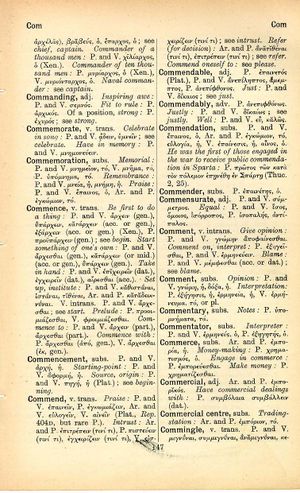commentator: Difference between revisions
From LSJ
στάζει γὰρ αὖ μοι φοίνιον τόδ᾽ἐκ βυθοῦ κηκῖον αἷμα → blood oozing from the deep wound, bloody gore drops oozing from the depths of my wound
(CSV3) |
(6_4) |
||
| Line 3: | Line 3: | ||
<b class="b2">Interpreter</b>: P. and V. [[ἑρμηνεύς]]. ὁ, P. [[ἐξηγητής]], ὁ. | <b class="b2">Interpreter</b>: P. and V. [[ἑρμηνεύς]]. ὁ, P. [[ἐξηγητής]], ὁ. | ||
}} | |||
{{Lewis | |||
|lshtext=<b>commentātor</b>: ōris, m. 2. [[commentor]].<br /><b>I</b> An [[inventor]], [[contriver]] ([[post]]-[[class]]. and [[rare]]): omnium falsorum, App. Mag. p. 321, 36: evangelii, i. e. the [[author]], Tert. Res Carn. 33.—<br /><b>II</b> An [[interpreter]]: legum, Cod. Just. 1, 17, 2, § 20; Serv. ad Verg. E. 6, 11. | |||
}} | }} | ||
Revision as of 08:26, 13 August 2017
English > Greek (Woodhouse)
subs.
Interpreter: P. and V. ἑρμηνεύς. ὁ, P. ἐξηγητής, ὁ.
Latin > English (Lewis & Short)
commentātor: ōris, m. 2. commentor.
I An inventor, contriver (post-class. and rare): omnium falsorum, App. Mag. p. 321, 36: evangelii, i. e. the author, Tert. Res Carn. 33.—
II An interpreter: legum, Cod. Just. 1, 17, 2, § 20; Serv. ad Verg. E. 6, 11.

